Menu



Oyster mushrooms are more than just a delicious addition to your meals—they’re a powerhouse of essential nutrients. Including oyster mushrooms in your diet may support your immune system, assist in weight management, and contribute to overall heart health.
At Real Mushrooms, we offer 100% mushroom products, including organic extract capsules, powders, and blends to help you conveniently incorporate mushrooms into your daily routine. Discover common oyster mushroom benefits and how they can enhance your well-being.
Oyster mushrooms are a powerhouse of essential vitamins and minerals that potentially benefit overall health. Let’s dive into some of the key nutrients that these edible fungi offer:
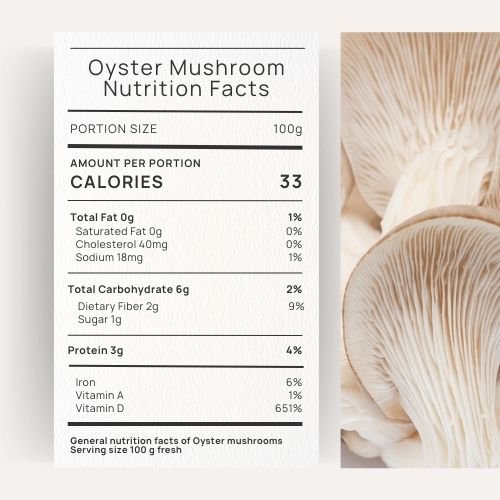
Oyster mushrooms provide a rich source of vitamin D, with a single serving offering 651% of the daily value. [1]
Vitamin D has many health benefits, including supporting bone health, immune function, and calcium absorption.
Additionally, these mushrooms are a good source of dietary fiber and iron, which can contribute to overall digestive health and support oxygen transport in the blood (1).
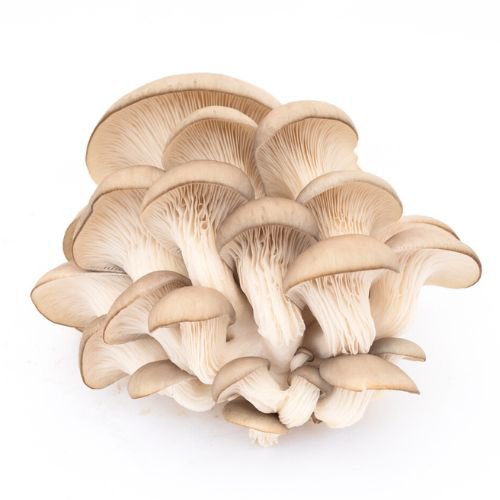
Oyster mushrooms are believed to contain compounds that may support the immune system. Let’s explore some of the key components that make these mushrooms a powerhouse for health.
One of the standout compounds in oyster mushrooms is beta-glucans. These naturally occurring polysaccharides have been shown to enhance the immune system. An animal study showed that beta-glucans work by activating various immune cells, such as macrophages, which are believed to support overall immune function. [2]
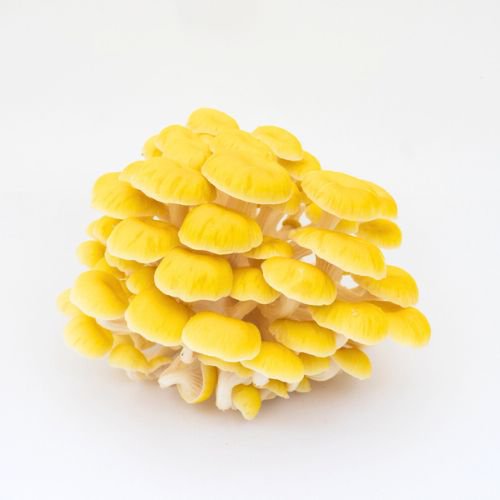
The amino acid ergothioneine is another remarkable compound found in oyster mushrooms. This antioxidant amino acid helps protect your cells from oxidative stress, which can weaken the immune system over time.
Some oyster mushrooms with high ergothioneine contents include king oyster mushrooms and pearl oyster mushrooms. Golden oyster mushrooms also contain about 10.65 mg/g DM ergothioneine.
By reducing oxidative damage, ergothioneine supports overall immune function and helps maintain your body’s natural defenses. [3]
In addition to beta-glucans, oyster mushrooms may contain other polysaccharides that can help support healthy immune markers.
These complex carbohydrates can stimulate the production of cytokines, which are proteins that promote a healthy inflammation response and can help your body fight off free radicals. Free radical damage helps the human body respond more effectively to harmful invaders. [4]
Oyster mushrooms are also rich in essential vitamins and minerals that support immune health.
For example, they contain high levels of vitamin D, which is crucial for the proper functioning of the immune system. They also provide a good amount of zinc and selenium, which play vital roles in maintaining immune health.
Pearl oyster mushrooms, king oyster mushrooms, and blue oyster mushrooms have been gaining attention for their potential immune-boosting properties. If you’re curious about how these mushrooms can support your immune system, you’re in the right place.
Did You Know? Oyster mushrooms come in various colors, each with unique potential health benefits. The yellow strain is believed to have high antioxidant potential, while the dark gray and pink strains are thought to support cellular health in the colon. [8]
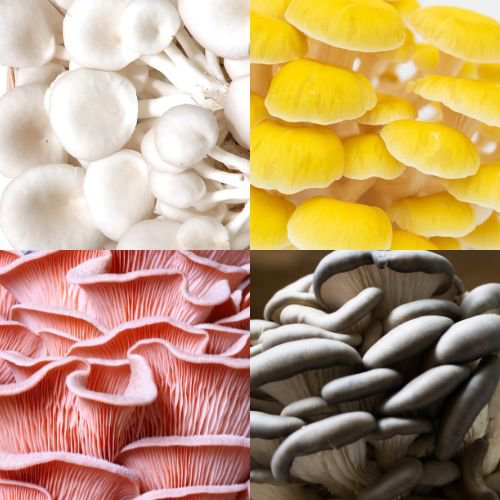
Oyster mushrooms are packed with potent antioxidants, which are compounds that help protect the body’s cells from damage caused by free radicals. This protection could be beneficial for overall health and well-being.
Oxidative stress is associated with various brain health challenges. The antioxidants in oyster mushrooms are thought to support brain health by helping to protect the body’s cells from oxidative damage and potentially managing conditions that occur with old age.
A strong immune system plays a vital role in maintaining overall health. The antioxidants in oyster mushrooms are believed to support immune function by protecting immune cells from oxidative stress.
Oxidative stress can also impact skin health, contributing to premature aging and other skin concerns. [9]
The potent antioxidants in oyster mushrooms are thought to support skin health by helping to protect skin cells, potentially promoting a healthier, more youthful appearance.

Oyster mushrooms are a fantastic addition to your diet if you’re looking to support heart health naturally. These wild mushrooms are packed with nutrients that help keep your heart in shape.
Let’s dive into some of the key nutrients in oyster mushrooms and their many health benefits for your heart.
Potassium is an essential nutrient found in oyster mushrooms. This mineral plays a crucial role in maintaining blood pressure already within a normal range.
High blood pressure is a major risk factor for heart conditions, and consuming potassium-rich foods like oyster mushrooms can help enhance circulation and support the health of the cardiovascular system.
Oyster mushrooms are rich in antioxidants, including ergothioneine and selenium. These antioxidants can help the human body fight off free radicals, which may impact heart and blood vessel health over time.
By facilitating free radical damage, antioxidants in oyster mushrooms can support overall cardiovascular health.
B vitamins, particularly niacin (B3), pantothenic acid (B5), and folate (B9), are abundant in oyster mushrooms. Niacin helps improve blood lipid levels, reducing the risk of heart conditions.
Folate, on the other hand, helps break down homocysteine, an amino acid that, at high levels, is associated with an increased risk of heart conditions.
Magnesium is another heart-friendly mineral found in oyster mushrooms. It plays a role in maintaining a regular heartbeat and supporting the function of heart muscles. Adequate magnesium intake is associated with overall heart health and can help maintain normal heart rhythms.
Interestingly, oyster mushrooms contain a naturally occurring statin called lovastatin. Statins are commonly prescribed medications for lowering cholesterol, and lovastatin works similarly by:
Oyster mushrooms are not just a delicious addition to your meals; they also come packed with dietary fiber, which may play a role in maintaining a healthy digestive system.
Let’s explore how the fiber content in oyster mushrooms can support digestion and why incorporating them into your diet may be beneficial for your gut health.
Dietary fiber is essential for a well-functioning digestive system and regulating digestion. It adds bulk to the stool, making it easier to pass, and helps manage stomach discomfort such as constipation. A healthy gut microbiome is linked to improved digestion, better nutrient absorption, and enhanced immune function.
Oyster mushrooms may offer digestive wellness benefits. The insoluble fiber in oyster mushrooms is believed to support bowel regularity by aiding smooth movement through the digestive tract, which may help promote regular bowel movements. This may reduce the risk of constipation.
Additionally, the soluble fiber in oyster mushrooms nourishes the beneficial bacteria in your gut. A healthy gut microbiome is crucial for overall digestive health and can positively influence your mood and immune system. Furthermore, soluble fiber slows the digestive process, allowing for better absorption of essential nutrients from your food.
Fiber-rich foods like oyster mushrooms can support weight management by helping you feel fuller for longer, potentially reducing the likelihood of overeating.
Oyster mushrooms are not just a tasty addition to your meals; they also come with a host of health benefits, including prebiotic properties that can support your digestive health. Prebiotics are a type of fiber that feeds the good bacteria in your gut, helping them thrive and maintain a healthy balance.
This, in turn, may contribute to overall digestive health and support the immune system. Oyster mushrooms contain a type of soluble fiber called beta-glucans, known for their ability to act as prebiotics [13].
When you consume oyster mushrooms, the beta-glucans pass through your digestive system and reach the colon, where they serve as food for beneficial gut bacteria.
Oyster mushrooms are believed to support overall digestive comfort and may help with occasional bloating and abdominal discomfort.
The antioxidant compounds in oyster mushrooms are thought to support a balanced gut environment and may contribute to maintaining gut health by supporting a healthy inflammatory response.
When it comes to enjoying oyster mushrooms' many health benefits, it’s natural to wonder about any potential side effects. The good news is that oyster mushrooms are generally safe for most people to consume.
However, as with any food, there are a few things to keep in mind to ensure a positive experience with these oyster mushrooms:
Some individuals may experience mild digestive issues such as bloating, gas, or stomach cramps, especially if they are not used to consuming high-fiber foods such as oyster mushrooms. To minimize this, start with small amounts and gradually increase your intake.
Although rare, some people might be allergic to oyster mushrooms. Symptoms can include itching, swelling, or difficulty breathing. If you have a known mushroom allergy, it’s best to avoid oyster mushrooms or consult with a healthcare provider before trying them.
Oyster mushrooms contain compounds that can interact with certain medications, particularly blood thinners. If you are on medication, it’s wise to check with your doctor to ensure no adverse interactions.
Highlight: Oyster mushrooms are generally safe to eat, but some individuals may experience mild digestive issues, allergic reactions, or interactions with medications.
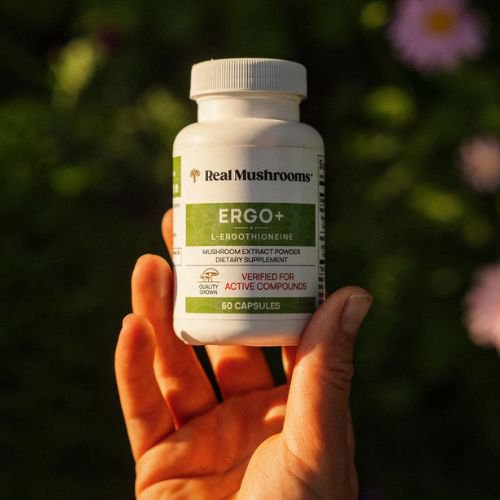

Oyster mushrooms—king oyster mushrooms, pearl oyster mushrooms, and blue oyster mushrooms—are packed with nutritional value and offer a wealth of health benefits. They include supporting the immune system, promoting heart health, aiding in weight management, and improving digestion.
Incorporating Real Mushrooms' products into your diet is a great way to enjoy the highest quality and wholesome benefits of oyster mushrooms. Unlike other brands that may claim they use mushrooms but use only mycelium, Real Mushrooms exclusively uses 100% organic mushrooms.
Scientifically, the mushroom is the fruiting body of the fungi, not the mycelium or other parts.
The highest concentrations of active compounds and nutrients are found in the fruiting bodies of edible fungi, including beta-glucans, ergothioneine, and other essential polysaccharides. These compounds are responsible for the myriad health benefits associated with mushrooms, from boosting immune function to providing powerful antioxidants.
Real Mushrooms ensures that our products deliver maximum efficacy, to make the most significant difference in your health and wellness journey. Choose Real Mushrooms for 100% mushroom extract products, and experience the full spectrum of nature’s potent health benefits.
 .
.Disclaimer: The information or products mentioned in this article are provided as information resources only, and are not to be used or relied on to diagnose, treat, cure, or prevent any disease. This information does not create any patient-doctor relationship, and should not be used as a substitute for professional diagnosis and treatment. The information is intended for health care professionals only. The statements made in this article have not been evaluated by the Food and Drug Administration. Any products mentioned are not intended to diagnose, treat, cure, or prevent any disease. The information in this article is intended for educational purposes. The information is not intended to replace medical advice offered by licensed medical physicians. Please consult your doctor or health practitioner for any medical advice.